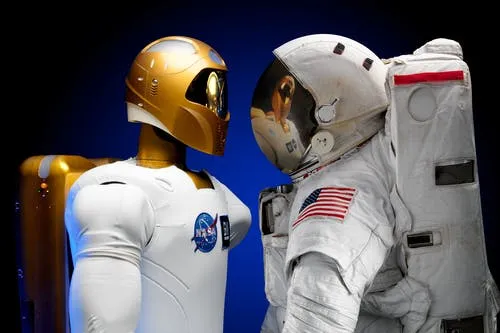
20 Fascinating Artificial Intelligence Books, Fiction & Nonfiction
This content contains affiliate links. When you buy through these links, we may earn an affiliate commission.
Artificial intelligence is already pervasive in our modern world—even in my field of public relations, the emerging role of AI for the industry is becoming a hot emerging topic. Whether you’re just curious about how to use AI more effectively in your day-to-day life, curious about what’s on the horizon, or already planning how to destroy Skynet, there are myriad artificial intelligence books already exploring the possibilities in fiction and nonfiction alike.
Here are 20 great artificial intelligence books exploring the topic from every angle.

We’re starting the list with a classic we all know, thanks to the Will Smith film. This first novel in Asimov’s Robot series is a showcase of his three laws of robotics and a haunting exploration of what happens when artificial intelligence becomes just a little too human, reflecting back at us our madness, our humor, our loyalties and even our flaws in a series of interlinked stories.
Following another World War, humanity flees to Mars and creates a simulated world for itself filled with AI replicas of sheep, birds, cats, and even humans for their new life. The government bans these too-human machines, who go into hiding in plain sight. It’s up to bounty hunters like Rick Deckard to “retire” them—but they don’t come willingly.
In this longest work of Ted Chiang (writer of the short story Arrival was based on), he follows an artificial intelligence and the humans who created it over the course of a decade. Along the way, they cope with cycles of software updates and obsolescence, struggle with relationship tensions and lay bare the difference between processing power and intelligence. All within the setting of an eerily familiar near future.
Case, a former data-thief, is offered a second chance to access cyberspace by a mysterious new employer—as long as he will use his renewed abilities to chase down the most powerful and devious artificial intelligence. This novel offers a high action thrill ride that twists and lurches in its desperate attempt to stop the worst of enemies, one we created ourselves.
Inspired by Hopkinson’s Caribbean roots, this richly drawn tale blends the dark mystery of folklore with tropes of science fiction. In the backdrop of its alternate-planet setting is an omniscient AI called Nanny.
Be warned, this coming-of-age tale explores some pretty grim themes.
On a remote, icy planet, the soldier known as Breq is drawing closer to completing her quest. But Breq is no typical human—she was once the AI of a massive spaceship serving the military of a government that has overtaken the galaxy. Now trapped in a body, she will not rest until her betrayal is avenged.
Another set of artfully connected science fiction short stories, this collection is true to its title, offering a portrait of a near future United States. The consequences of technological advances, including AI, are woven into each, folded into a greater world that is fractured, shellshocked and full of hate.
This anthology is exactly what it sounds like—a face-off between powers of robots and fairies through a series of stories that are playful, dark, funny and chilling by turns. Featuring works from talented genre authors including Sarah Gailey, Ken Lin, John Scalzi, and Catherynne M. Valente, this collection offers many different takes on the potential and risks of artificial intelligence.
In this young adult novel, Shusterman goes ahead and makes a huge assumption—that a practically omniscient, benevolent AI is possible and inevitable—and moves past it to explore what a world beyond mankind’s management looks like. In Scythe, a world where all causes for death have been eliminated but the population must still be managed, the only thing left in human hands is death. At the open of this series, two teens are brought into the fold of elite Scythes who take on this burden.
As the galaxy destroys itself with war, seven people flee together in pursuit of a distant planet far beyond civilization’s grasp, seeking a creature both feared and worshipped. Throughout these pilgrims’ stories, AI looms as an almost all-powerful, uncontrollable presence, and emerges as an even more prominent player within the world in the later novels of the series.
When a legendary computer game architect dies, his obituary awakens a dormant daemon—an untriggered computer program kept quietly to the background. As the program mobilizes human followers and even orders assassinations, Detective Sebeck must find a way to close in on the program and end its chaos.
Written by a robotics expert, Robopocalypse explores a Terminator-like future where Archoes, a network of artificial intelligence and robots, has taken over. What’s left of the human race has been pushed to the fringes in their fight to survive.
Technology is already controlling more and more of our lives every day, sometimes in ways we barely stop to think about. As programs slowly do more of our thinking, Du Sautoy reassuringly insists that there are, indeed, some ways in which technology can never replace human ingenuity.
While many of the books on this list focus on the future, this one spends most of its journey looking back. Starting as far back as the automata of the Renaissance and delving to a series of case studies, this book offers glimpse into the functionality of technological advances like self-driving cares and software programs that learn while playing video games, on the journey toward artificial intelligence. Along the way, Gerrish breaks down the functionality of these advances in (almost) accessible laymen’s terms.
In the future-focused followup to Harari’s New York Times bestseller Sapiens, he turns his focus to humanity’s future, and the new challenges that are bound to meet us there as technology addressed the issues of today. What happens when starvation is ended, when disease is cured, when war is over?
This book is a call for leadership that will put people first in the midst of a period of thriving diversity among AI technologies. It also sketches a look ahead at where those solutions might lead our future society—and its potential ripple effects. It offers a practical insights into what’s necessary for today’s leadership—and all of us—to plan a future that is human-friendly.
We have already seen many imaginings of science fiction and even fantasy worlds brought into the realm of the possible, from invisibility cloaks to robotic surgery to virtual worlds. This book brings the fictional into the real world, exploring what it would mean for people if teleportation, time travel, and yes, AI, were to become real—as well as the science of what it would take to make them real.
How to Create a Mind breaks down the science of what it would take to create an artificial intelligence that thinks like a human. In addressing the topic in specific and pragmatic terms, he also brings the possibility of such an intelligent machine seem uncomfortably real.
In Weapons of Math Destruction, O’Neil brings to the forefront all of the many ways algorithms have taken over aspects of our daily life—not in some distant future, but right here, today. As she peels back the hidden layers of technology that inform everything from how we get health insurance to where we go to school, she also calls for more regulation of algorithms.
Every day, the actions we take in our typical modern lives create data. And that data is used to power AI. Another book about the threats of the technology already shaping our lives today, this book explores the roles of major tech companies and how they are shaping our futures.
Forget a distant future with AI that runs our spaceships and our utopian (or dystopian) governments—here, Yao, Zhou, and Jia have foregone the typical futurism of AI, opting instead for a practical look at what today’s AI technology means for business.
Want even more artificial intelligence books? Check out our post on the best cyberpunk books!
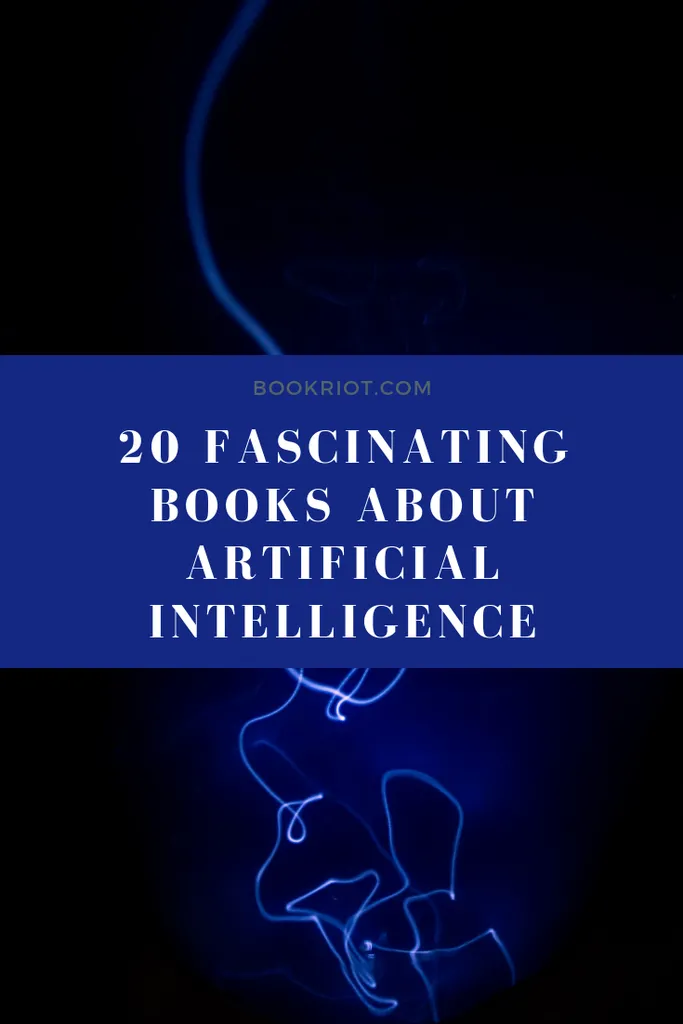



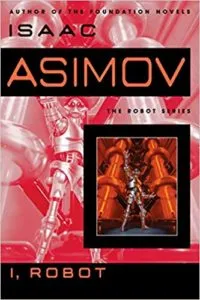
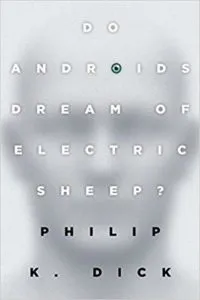 Do Androids Dream of Electric Sheep?
Do Androids Dream of Electric Sheep?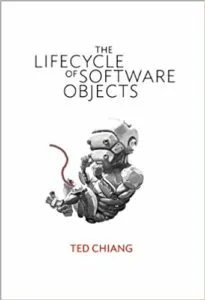
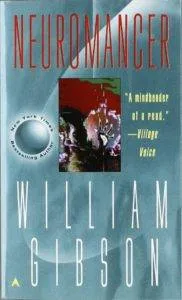 Neuromancer
Neuromancer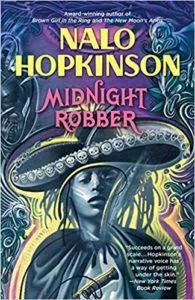 Midnight Robber
Midnight Robber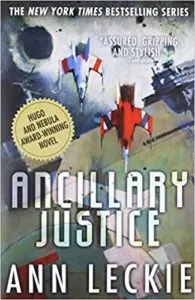 Ancillary Justice
Ancillary Justice 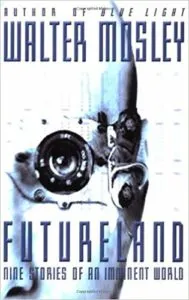 Futureland
Futureland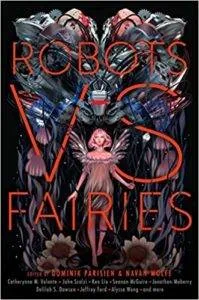 Robots vs. Fairies
Robots vs. Fairies Scythe
Scythe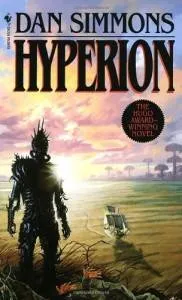 Hyperion
Hyperion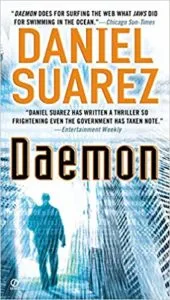 Daemon
Daemon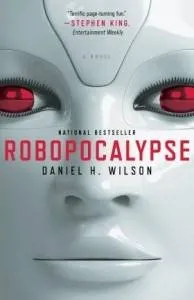 Robopocalypse
Robopocalypse
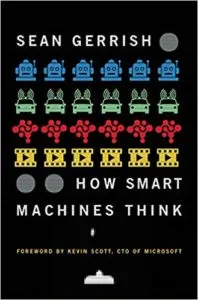
 Homo Deus
Homo Deus 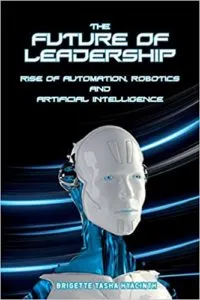 The Future of Leadership: Rise of Automation, Robotics and Artificial Intelligence
The Future of Leadership: Rise of Automation, Robotics and Artificial Intelligence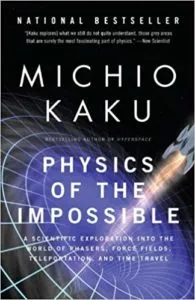 Physics of the Impossible: A Scientific Exploration into the World of Phasers, Force Fields, Teleportation, and Time Travel
Physics of the Impossible: A Scientific Exploration into the World of Phasers, Force Fields, Teleportation, and Time Travel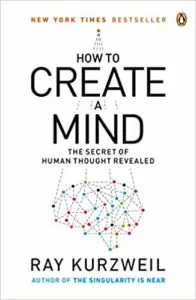 How to Create a Mind: The Secret of Human Thought Revealed
How to Create a Mind: The Secret of Human Thought Revealed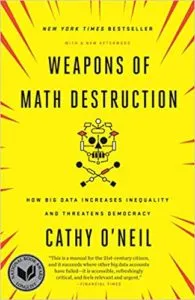 Weapons of Math Destruction
Weapons of Math Destruction










